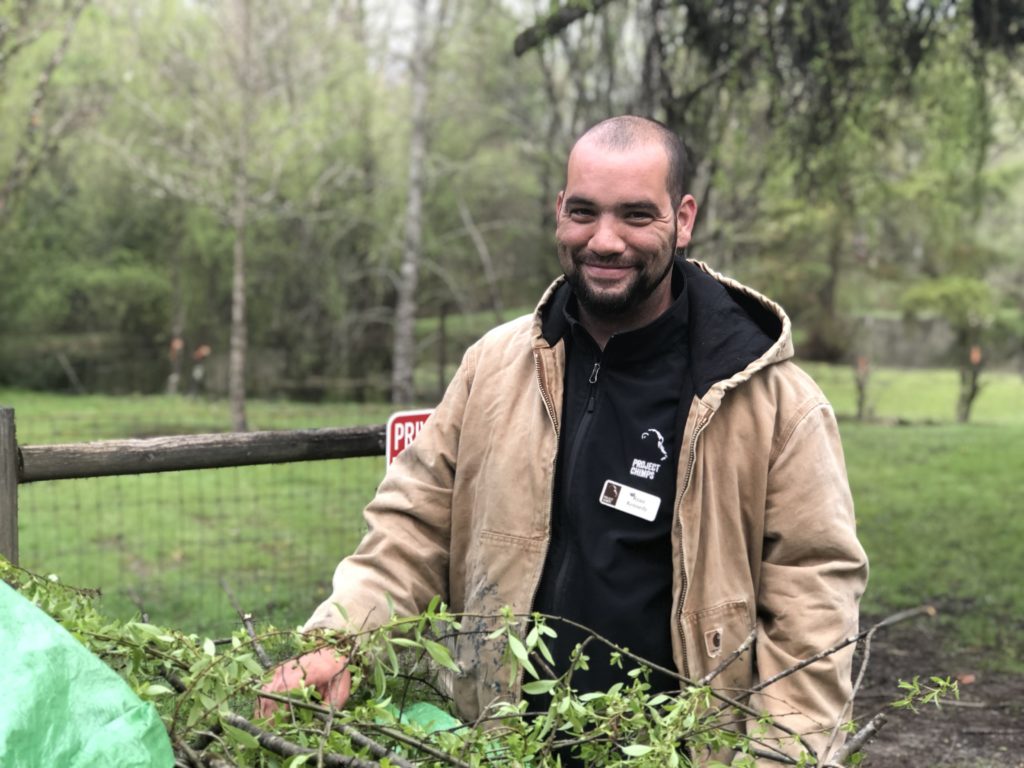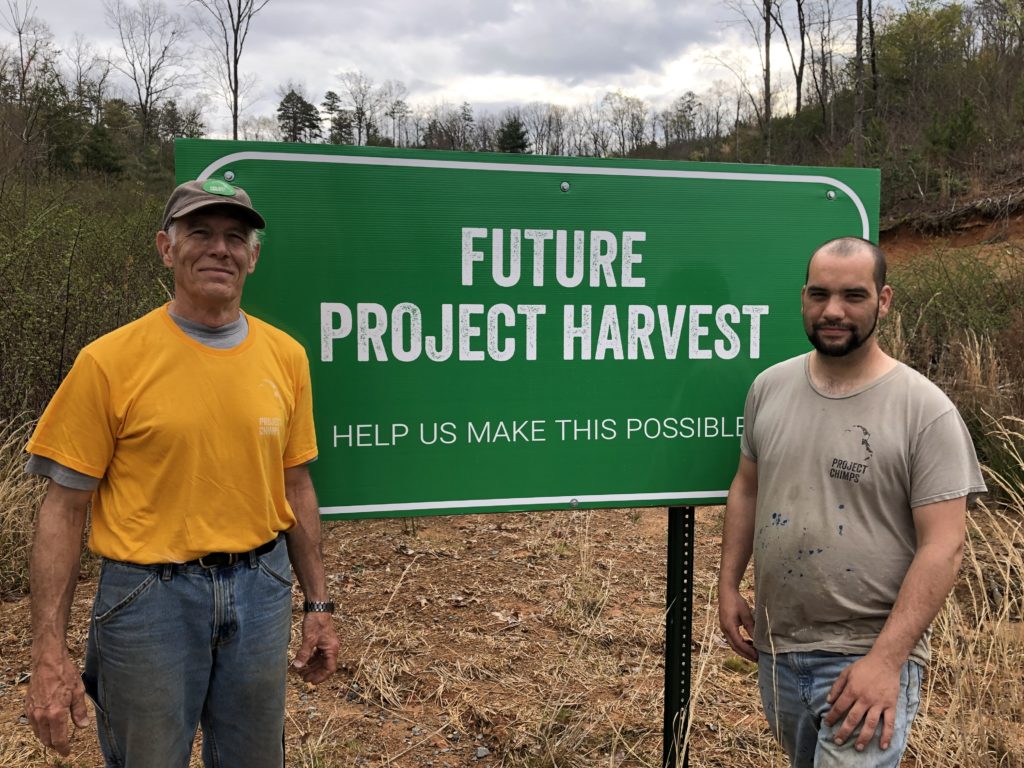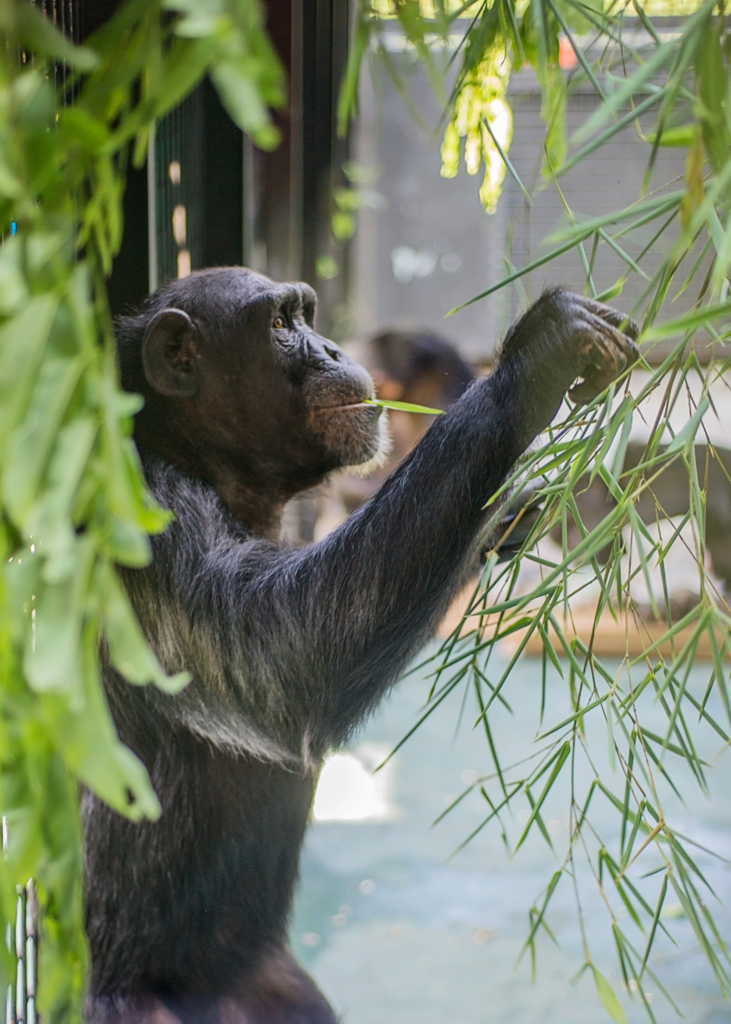
Seeing the Forest for the Chimps

Don’t make him choose between plants and primates. Both are equally his passion.
Ryan Kennedy combines his expertise in horticulture with his passion for chimpanzees in the newly created position of Landscape Specialist at Project Chimps. On any given day, you’ll find Ryan bushwhacking through tall stands of invasive bamboo or climbing ladders to carefully prune native trees in the forest. His cuttings then become a major source of enrichment for former research chimpanzees.

Those chimpanzees are now permanently retired at Project Chimps, a 236-acre sanctuary for chimpanzees retired from medical research, located in the forested Blue Ridge Mountains in north Georgia.
Chimpanzees thrive in north Georgia
The wild chimpanzee’s natural habitat are the jungles of Africa. So how do captive chimps fare in the habitat of southern Appalachia? Very well, says Ryan.
“In the wild chimps eat a variety of fresh leaves, fruit, and nuts from various places in their territory. Here in the sanctuary, we bring in plants that are edible to them so they can have a varied diet beyond commercial fruits and vegetables and their nutritional chimp chow biscuits,” said Ryan, adding with a wry smile, “It’s edible enrichment that doesn’t make them fat.”
The plants also help the chimps to learn natural foraging and browsing behaviors they would have learned in the wild.
At Project Chimps, the chimpanzee residents receive daily enrichment to nourish and engage them. Many of the chimpanzees get enrichment by going outdoors to forage in the sanctuary’s forested, 6-acre Peachtree Habitat. Some chimpanzees, however, prefer to stay indoors. So Ryan brings the plants to them.
The mountains are calling and I must eat
With 236-acres of forest at his disposal, Ryan has plenty of native plant material to work with.
The sloping hills around the sanctuary are covered in partially edible trees like tulip poplar, sweet gum, black walnut, hickory, dogwood and willow. In early summer, the forest understory brims with wild blackberries and black raspberries. Later in the season, muscadine grapes begin to ripen on the vine.
A number of edible invasive plants surround the old homestead cabin on the property, so Ryan goes after those plants with zeal. He harvests bamboo, Rose of Sharon hibiscus, and autumn olive and carts them up to the chimpanzees’ villas. There, the chimpanzee caregivers spread them on the open-air porches of the villas and above the mesh tunnels that connect the chimp villas to the Peachtree Habitat.
This type of enrichment is known in the chimpanzee care community as “browse.”
Read the companion article about the role of browse in the chimp’s lives here.
Pollinators welcome
When Ryan’s not harvesting plant materials for chimpanzee browse, he’s tending to the sanctuary’s onsite gardens and a small honey bee colony. In addition to pollinating the plants, the honey is humanely collected to provide enrichment for the chimps too who would naturally eat honey and honeycomb in the wild.
His vision, and that of Project Chimps’ executive director, Ali Crumpacker, is to grow as much of the chimpanzees’ food onsite as possible. To that end, the pair are working in collaboration with the sanctuary’s facilities manager, Christy Jellets, to build Project Harvest.

Project Harvest will include a large-scale, fruit and vegetable garden, green house, and an apiary (bee hives). Ryan will apply permaculture gardening techniques and hopes to grow as much of the food organically, as possible.
Volunteers will help plant and harvest food for the chimps, as well as pruning native plants for chimpanzee browse. Ali and the team are currently seeking private donors to make this dream a reality – and it’s no small undertaking. Project Harvest will operate like a small farm.
Inspired to action
Ryan never imagined he would work at a chimpanzee sanctuary. One day he watched a program on public television and it changed the course of his life.
He watched Ape Genius on the documentary series Nova, and became fascinated by apes. Next, he watched the movie, Chimpanzees: an Unnatural History, and it inspired him to action.
“I realized that chimpanzees are incredibly smart,” says Ryan. “They really are a higher life form.”
He wanted to help chimpanzees. But how?
At the time, he was pursuing a certificate in horticulture at Chattahoochee Technical College’s North Metro campus in nearby Acworth, Georgia. Then a friend told him there was a fledgling gorilla sanctuary within an hour’s drive. So he signed up for a summer internship and later joined the staff.
Ryan went to work clearing dead brush and building basic infrastructure for the sanctuary, which closed a few years later. When he heard that Project Chimps had purchased the property, he reached out immediately.
Project Chimps hired Ryan as a Chimpanzee Caregiver Aide in early 2017 and he began to apply his horticultural skills to provide daily enrichment for the chimps.
A dream come true
“It was the most magical day of my life. It was my life’s dream come true,” Ryan exclaims.
The chimpanzees turned out to be even smarter than he thought.
“I quickly learned how long to cut some of the browse plants. Emma got a 12-inch stick and used it to poke caregivers through the mesh of her large group enclosure. So now the sticks are cut down to 6 inches,” Ryan says with a grin.

Ryan would love to go to Africa to see chimpanzees in the wild someday.
“In the meantime, I get to see them in Blue Ridge, Georgia,” he says with satisfaction.
Contact us today to find out how you can make a significant contribution for Project Harvest. Learn how you can volunteer with Ryan and the Project Harvest team here or donate a needed gardening tool from our Amazon Wish List.
